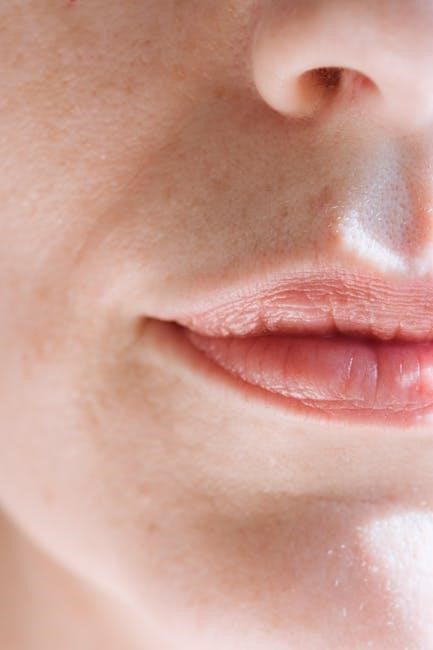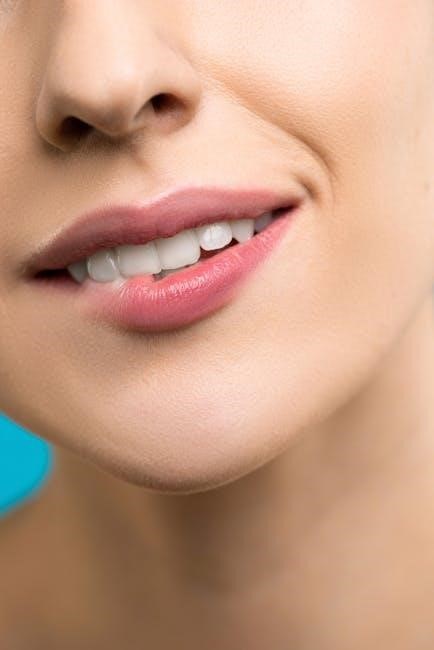Mouth guards are crucial for protecting teeth and maintaining oral hygiene. This guide provides essential care steps to ensure effectiveness, longevity, and freshness, promoting better oral health.
Importance of Mouth Guards in Oral Health
Mouth guards play a vital role in protecting teeth and gums from damage caused by grinding, sports injuries, or nighttime clenching. They act as a barrier, preventing chipping, cracking, or wear on teeth. Regular use can also reduce the risk of jaw pain and TMJ disorders. Properly maintained mouth guards ensure optimal protection and hygiene, preventing the buildup of bacteria and plaque. Neglecting to clean or store them correctly can lead to bad breath, gum irritation, or infections. By prioritizing mouth guard care, individuals can safeguard their oral health, maintain fresh breath, and extend the lifespan of their dental appliance. Consistent maintenance is key to reaping these benefits effectively.
Why Proper Care is Essential
Proper care is essential to maintain the effectiveness and hygiene of your mouth guard. Neglecting to clean or store it correctly can lead to bacterial growth, causing bad breath, gum irritation, or infections. Daily rinsing and brushing with toothpaste help remove plaque and debris, while deep cleaning with denture tablets or mouthwash ensures thorough disinfection. Storing the guard in a dry, ventilated case prevents moisture buildup, which fosters bacteria. Regular maintenance also extends the lifespan of the mouth guard, ensuring it continues to protect your teeth and gums effectively. Without proper care, the appliance may become less effective or even harmful, undermining its purpose in safeguarding your oral health. Consistent upkeep is crucial for optimal protection and freshness.

Types of Mouth Guards
Mouth guards come in various types, including sports, night guards for bruxism, and sleep apnea models, each designed for specific needs and protection levels.
Sports Mouth Guards
Sports mouth guards are essential for protecting teeth during physical activities. They are typically made of durable materials to absorb impact and prevent injuries. Proper care involves rinsing after use, brushing with toothpaste, and drying thoroughly to prevent bacterial growth. Storing them in a ventilated case ensures they remain fresh. Regular inspections for wear and tear are crucial, as damaged guards may not provide adequate protection. Replacement is usually needed every sports season or sooner if signs of deterioration appear. By maintaining your sports mouth guard, you ensure optimal protection and hygiene, safeguarding your oral health during athletic activities. Regular cleaning and proper storage are key to extending its lifespan and effectiveness.
Night Guards for Bruxism

Night guards are specifically designed to address bruxism, protecting teeth from grinding and clenching during sleep. They are typically made of durable, comfortable materials to cushion the jaw and prevent tooth wear. Proper care involves rinsing with water after use, brushing gently with toothpaste, and drying thoroughly to avoid bacterial buildup. Storing the guard in a clean, dry case is essential to maintain hygiene. Night guards can last 1-5 years, depending on usage and material quality. Regular inspections for cracks or worn areas are important, as these can indicate the need for replacement. By following care guidelines, night guards remain effective in preventing dental damage and alleviating bruxism symptoms, ensuring long-term oral health and comfort;
Mouth Guards for Sleep Apnea
Mouth guards for sleep apnea, often called mandibular advancement devices, are custom-fitted appliances that reposition the lower jaw to keep airways open during sleep. They are a non-invasive treatment option for mild to moderate sleep apnea. Proper care involves rinsing with water after use, brushing gently with toothpaste, and drying thoroughly to prevent bacterial growth. Storing the device in a clean, dry case is essential to maintain hygiene. Regular inspections for wear or misalignment are recommended, as these can affect effectiveness. By following care guidelines, mouth guards for sleep apnea remain effective in improving breathing patterns and enhancing sleep quality, making them a vital tool for managing this condition and promoting overall health.

The Importance of Maintenance
Regular maintenance ensures your mouth guard remains clean, effective, and durable, preventing bacterial growth and extending its lifespan while protecting your oral health.
Preventing Bacterial Growth
Preventing bacterial growth on your mouth guard is vital to maintain oral hygiene and prevent infections. Bacteria thrive in moist environments, so thorough drying after use is essential. Regular rinsing with water or mouthwash helps remove debris and reduce microbial buildup. Brushing your mouth guard with toothpaste gently eliminates plaque and bacteria. Deep cleaning with denture cleaner tablets or soaking in mouthwash once a week further sanitizes it. Avoid storing your guard in a wet case, as this fosters bacterial growth. By following these steps, you can keep your mouth guard clean, fresh, and free from harmful bacteria, ensuring optimal protection for your teeth and gums.
Ensuring Effectiveness and Longevity
Proper care is essential to ensure your mouth guard remains effective and lasts longer. Regular cleaning and maintenance prevent bacterial buildup, which can compromise its functionality. Rinsing your mouth guard after each use removes debris and saliva, while brushing it with toothpaste gently eliminates plaque. Deep cleaning methods, such as soaking in mouthwash or using denture cleaner tablets, further sanitize the guard. Storing it in a ventilated case prevents moisture retention, reducing bacterial growth. Avoiding harsh chemicals ensures the material remains intact. By following these steps, you maintain the guard’s effectiveness and extend its lifespan, ensuring continued protection for your teeth and gums. Proper care is a simple yet crucial investment in your oral health.
Daily Care Instructions
Rinse your mouth guard after each use, brush it gently with toothpaste, and dry it thoroughly to maintain hygiene and effectiveness.
Rinsing After Each Use
Rinsing your mouth guard after each use is essential to remove bacteria, plaque, and debris. Use warm water or a non-alcoholic mouthwash to rinse thoroughly. This simple step prevents bacterial growth, bad breath, and gum irritation. Regular rinsing ensures your mouth guard remains clean and effective, protecting your oral health. Always rinse before storing to maintain hygiene and prevent contamination. This daily habit is crucial for keeping your mouth guard fresh and safe for use. By incorporating rinsing into your routine, you prolong the lifespan of your mouth guard and support overall oral hygiene. Consistency is key to maintaining its effectiveness and your health.
Brushing with Toothpaste
Brushing your mouth guard with toothpaste is a simple yet effective way to maintain its cleanliness. Use a soft toothbrush and non-abrasive toothpaste to gently scrub all surfaces. This removes plaque, bacteria, and odors, ensuring freshness. Avoid using harsh chemicals or abrasive products, as they can damage the material. After brushing, rinse thoroughly with water to remove any toothpaste residue. Regular brushing helps prevent bacterial buildup and keeps your mouth guard effective. This step is especially important for night guards and sports mouth guards, which are exposed to saliva and debris for extended periods. By incorporating brushing into your daily routine, you can extend the lifespan of your mouth guard and maintain optimal oral hygiene. Consistency is key to keeping it clean and safe for use.
Proper Drying Techniques
Properly drying your mouth guard is essential to prevent bacterial growth and bad breath. After rinsing, gently pat it dry with a clean towel to remove excess moisture. Allow it to air-dry in a well-ventilated case, ensuring no moisture remains. Avoid placing it in a sealed container while still damp, as this creates a breeding ground for bacteria. Never use heat to speed up the drying process, as it may warp the material. By keeping your mouth guard dry, you reduce the risk of bacterial buildup and maintain its effectiveness. Regular drying also helps prevent odors and ensures your mouth guard remains fresh for continued use. Proper drying is a simple yet critical step in maintaining oral hygiene and extending the lifespan of your mouth guard.

Deep Cleaning Methods
Deep cleaning ensures your mouth guard remains effective and hygienic. Use denture cleaner tablets or non-alcoholic mouthwash for soaking, then rinse thoroughly. Weekly deep cleaning prevents bacteria buildup and keeps your mouth guard fresh.
Using Denture Cleaner Tablets
Denture cleaner tablets are an effective way to deep clean your mouth guard. Dissolve one tablet in water, soak the guard for 10-15 minutes, then rinse thoroughly. This method removes bacteria, plaque, and odors, ensuring freshness and effectiveness. Regular use helps maintain hygiene and prevents stains. Always follow the product instructions and rinse well to avoid any chemical residue. This method is ideal for weekly deep cleaning routines and keeps your mouth guard in optimal condition for continued protection and comfort. Remember to rinse thoroughly to ensure no tablet residue remains, as this can affect the guard’s fit and performance. This simple step enhances longevity and maintains oral hygiene effectively.
Soaking in Mouthwash
Soaking your mouth guard in mouthwash is an excellent way to disinfect and freshen it. Use a non-alcoholic mouthwash to avoid damaging the material. Submerge the guard for about 10 minutes to kill bacteria and eliminate odors. After soaking, rinse thoroughly with water to remove any mouthwash residue. This method is particularly effective for maintaining freshness and preventing bacterial growth. For best results, soak your mouth guard once or twice a week, depending on usage. Always choose a mouthwash suitable for dental appliances to ensure safety and effectiveness. This simple step enhances hygiene and prolongs the lifespan of your mouth guard, keeping it clean and ready for use.
Weekly Deep Cleaning Routine
A weekly deep cleaning routine is essential for maintaining your mouth guard’s hygiene and effectiveness. Start by rinsing the guard under warm water to remove loose debris. Next, soak it in a solution of denture cleaner tablets or non-alcoholic mouthwash for 10-15 minutes. This helps eliminate bacteria and freshen the material. After soaking, rinse thoroughly with water to remove any residue. For added cleanliness, gently scrub the guard with a soft toothbrush and mild soap; Finally, dry it completely before storing it in a clean, ventilated case. Regular deep cleaning prevents bacterial growth, odors, and stains, ensuring your mouth guard remains safe and effective for long-term use; Consistency is key to maintaining optimal oral hygiene and protecting your investment.
Storage and Handling
Store your mouth guard in a clean, ventilated case to prevent bacterial growth. Keep it dry and away from direct heat to maintain shape and effectiveness. Avoid tight containers to ensure proper airflow and prevent warping. Always check for damage before storing to ensure optimal protection and hygiene.
Using a Ventilated Case
A ventilated case is essential for storing your mouth guard to prevent bacterial growth and odors. It allows airflow, ensuring the guard remains dry and fresh. Avoid airtight containers, as they create a humid environment where bacteria thrive. Always place the mouth guard in the case after rinsing and drying it thoroughly. A ventilated case also helps maintain the shape of the guard, preventing warping or deformation. Regularly clean the case with mild soap and water, and ensure it is completely dry before storing the mouth guard. This simple step significantly reduces the risk of bacterial buildup and keeps your mouth guard hygienic and effective for long-term use.
Storing in a Cool, Dry Place
Storing your mouth guard in a cool, dry place is vital to prevent moisture buildup, which can lead to bacterial growth and unpleasant odors. Avoid placing it in humid environments like bathrooms or kitchens, as these areas promote moisture accumulation. Instead, use a well-ventilated case or a breathable container to ensure airflow. Never store your mouth guard in an airtight container, as this can trap moisture and create an ideal environment for bacteria. Additionally, keep it away from direct sunlight and extreme temperatures, as these can warp or degrade the material. Always ensure the mouth guard is completely dry before storing it to maintain its effectiveness and hygiene. Regularly cleaning the storage container can also help prevent bacterial buildup and odors.
When to Replace Your Mouth Guard
Replace your mouth guard when it shows signs of wear, such as cracks, thinning, or loss of shape. Sports guards should be replaced seasonally, while night guards may last 1-5 years depending on usage.
Replacement Intervals for Different Types
Sports mouth guards should be replaced every season or if they show wear. Night guards for bruxism typically last 1-5 years, depending on grinding intensity. Sleep apnea mouth guards may need replacement every 2-5 years. Regular inspections by a dentist can determine if a replacement is needed. Signs of wear, such as cracks, thinning, or loss of shape, indicate it’s time for a new guard. Proper fit and condition are crucial for effectiveness and oral health. Always consult your dentist for custom fits and adjustments to ensure optimal protection and hygiene.
Signs of Wear and Tear
Regularly inspect your mouth guard for signs of wear and tear, such as cracks, thinning, or discoloration. If it becomes loose or no longer fits securely, it may be time for a replacement. Additionally, visible damage like holes, fraying edges, or a warped shape indicates wear. Discoloration or stubborn stains that don’t fade with cleaning can also signal deterioration. If you notice any of these signs, consult your dentist for a professional assessment. Worn-out mouth guards may not provide adequate protection, leading to potential oral health issues. Addressing these signs promptly ensures continued effectiveness and safety for your teeth and gums.

Common Mistakes to Avoid
Avoid not rinsing your mouth guard after use, using harsh chemicals, or storing it in a wet environment. These mistakes can lead to bacterial growth and damage.
Not Rinsing After Use
Not rinsing your mouth guard after use is a common mistake that can lead to bacterial growth and bad breath. Bacteria and plaque accumulate on the surface, creating an ideal environment for germs to thrive. If left unwashed, these bacteria can cause gum irritation, infections, and unpleasant odors. Regular rinsing with water or mouthwash helps remove debris and saliva, preventing the buildup of harmful microorganisms. Neglecting this step can compromise the effectiveness of your mouth guard and negatively impact your oral health. Always rinse your mouth guard thoroughly after each use to maintain its cleanliness and ensure it remains safe for daily use.

Using Harsh Chemicals
Using harsh chemicals to clean your mouth guard can damage its material and reduce its effectiveness. Avoid using bleach, abrasive toothpaste, or strong detergents, as they can weaken the guard or cause discoloration. Instead, opt for gentle cleaning methods, such as rinsing with water or using a non-alcoholic mouthwash. Denture cleaner tablets are also a safe and effective option for deep cleaning. Harsh chemicals can alter the fit and protection your mouth guard provides, potentially leading to oral health issues. Always choose mild products to ensure your mouth guard remains in good condition and continues to protect your teeth and gums effectively.
Storing in a Wet Environment
Storing your mouth guard in a wet environment can lead to bacterial growth and unpleasant odors. Moisture creates an ideal breeding ground for germs, which can harm your oral health. Always store your mouth guard in a well-ventilated case to ensure it dries completely. Avoid leaving it in a closed, damp container, as this can foster mold and mildew. Proper storage in a cool, dry place is essential to maintain hygiene and effectiveness. Neglecting this can result in a mouth guard that is not only uncomfortable but also less protective, potentially leading to oral health issues over time.

Caring for Your Mouth Guard Case
Regular cleaning and drying of your mouth guard case are essential. Use mild soap and water, then air dry completely to prevent bacteria growth and maintain hygiene.
Cleaning the Case Weekly
Cleaning your mouth guard case weekly is essential to prevent bacteria buildup. Use mild soap and warm water, gently scrubbing with a soft brush. Rinse thoroughly and air dry to ensure no moisture remains, as dampness fosters germs. Regular cleaning prevents odors and maintains hygiene. Neglecting this step can lead to bacterial growth, affecting both the case and mouth guard. Always store the case in a dry, well-ventilated area to promote freshness. By following these steps, you protect your oral health and extend the lifespan of your mouth guard. Consistent care ensures your dental appliance remains safe and effective for daily use.
Ensuring the Case is Dry
Ensuring your mouth guard case is dry is crucial to prevent bacterial growth and odors. After cleaning, use a clean towel or paper towel to thoroughly dry the case. Allow it to air dry in a well-ventilated area to eliminate moisture. Storing a damp case can lead to mold and mildew, which can transfer to your mouth guard and cause bad breath or gum irritation. Always check that the case is completely dry before placing your mouth guard inside. This simple step helps maintain hygiene and ensures your mouth guard remains fresh and effective for daily use. Regular drying is essential for long-term oral health and appliance longevity.
Dental Visits and Professional Advice
Regular dental visits ensure your mouth guard fits properly and remains effective. Dentists can inspect for wear and provide adjustments, maintaining optimal protection and oral health.
Consulting Your Dentist for Custom Fits
A custom-fit mouth guard ensures optimal protection and comfort. Dentists use impressions of your teeth to create a precise fit, reducing irritation and improving performance. Regular inspections allow adjustments, maintaining effectiveness and preventing wear. A well-fitted guard enhances oral health and longevity, making it a worthwhile investment for long-term protection and comfort.
Regular Inspections and Adjustments
Regular inspections of your mouth guard are crucial to ensure it remains effective and hygienic. Check for signs of wear, such as cracks, thinning, or misalignment. Dentists recommend scheduling annual inspections to assess fit and condition. Adjustments may be needed to accommodate changes in your bite or tooth alignment. Professional guidance ensures your mouth guard continues to provide optimal protection and comfort. Neglecting inspections can lead to reduced effectiveness or discomfort. Stay proactive to maintain your oral health and extend the lifespan of your mouth guard with timely adjustments and expert advice.

Oral Health Benefits of Proper Care
Proper mouth guard care prevents bad breath, gum irritation, and infections. It maintains hygiene, protects teeth, and ensures optimal oral health for years to come;

Preventing Bad Breath
Proper mouth guard care is essential for preventing bad breath. Bacteria and plaque can accumulate on the guard, leading to unpleasant odors. Regular rinsing and brushing with toothpaste help eliminate these microorganisms, ensuring fresh breath. Neglecting to clean your mouth guard can result in lingering bad odors, which may also indicate poor oral hygiene. By maintaining a clean and dry mouth guard, you reduce the risk of bacterial growth that contributes to bad breath. Daily care routines, such as rinsing and brushing, are simple yet effective ways to keep your mouth guard fresh and your breath clean. This practice not only benefits oral hygiene but also enhances overall comfort and confidence.
Maintaining Gum Health
Proper mouth guard care plays a significant role in maintaining healthy gums. Neglecting to clean your mouth guard can lead to bacterial buildup, which may cause gum irritation and infection. Regular rinsing and brushing with toothpaste help remove plaque and bacteria, reducing the risk of gum-related issues. Additionally, storing your mouth guard in a dry, ventilated case prevents moisture retention, a breeding ground for harmful microorganisms. By following daily care routines and deep cleaning methods, you protect not only your mouth guard but also your gums from potential damage. Proper maintenance ensures your mouth guard remains a tool for oral health rather than a source of infection, promoting healthy gums and overall well-being.
Proper mouth guard care ensures effectiveness, longevity, and fresh breath. Regular cleaning and timely replacement protect your oral health, maintaining gum wellness and overall hygiene effectively.
Proper mouth guard care involves daily rinsing, brushing with toothpaste, and thorough drying to prevent bacterial growth. Deep cleaning with denture tablets or mouthwash ensures effectiveness. Store in a ventilated case in a cool, dry place to avoid moisture buildup. Replace your mouth guard as recommended, noting signs of wear like cracks or discoloration. Avoid harsh chemicals and wet storage to maintain hygiene. Regular dental check-ups ensure a proper fit and functionality. By following these steps, you protect your oral health, prevent bad breath, and maintain gum wellness. Consistent care extends the lifespan of your mouth guard, ensuring it remains a reliable tool for your dental protection and comfort.
Encouragement for Proper Maintenance
Proper mouth guard maintenance is a small effort with big rewards. By dedicating a few minutes daily to rinse, brush, and dry your guard, you ensure it remains fresh and effective. Regular deep cleaning with denture tablets or mouthwash prevents bacteria buildup, safeguarding your oral health. Storing it in a ventilated case and replacing it as needed prevents damage and maintains protection. Remember, consistent care is key to extending its lifespan and keeping your smile safe. Make maintenance a habit, and your mouth guard will continue to serve you well, promoting better oral hygiene and peace of mind. Your effort today ensures healthier teeth and gums tomorrow.